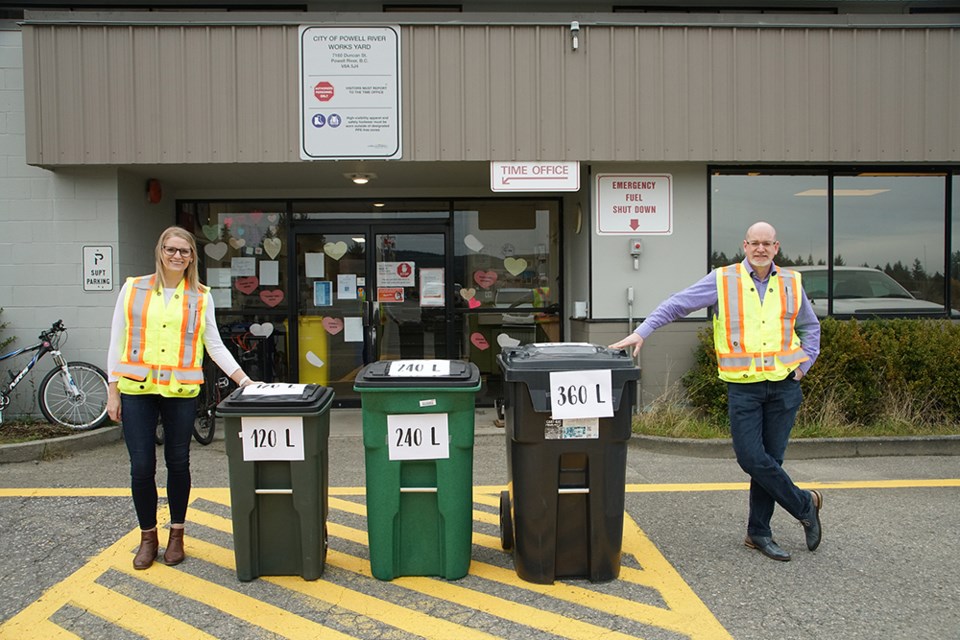City of Powell River Council will be considering a solid waste collection bylaw that proposes to substantially change the way the city deals with collecting garbage.
At the April 13 committee of the whole meeting, councillors received a verbal and written report from manager of operational services Rod Fraser, who said the bylaw would facilitate collecting waste using an automated system with carts, removing the need for garbage tags, and to adjust the annual garbage levy.
Fraser said garbage tags would still be used if residents had more garbage to place curbside than their carts would accommodate.
“If you have extra bags outside the cart, then you have the ability to still use a tag if you wish, however, most places wouldn’t need it, because the city would supply a 120-litre size household waste cart to each residence in the city,” said Fraser.
Multifamily dwellings would be provided 360-litre carts for every three units in the building to allow for the same volume for disposal, he added.
Fraser said the automated system, which uses special mechanized arms on garbage trucks, provides sanitation and an improvement in economics. The city has quite a bit of experience using the automated system through the organics collection pilot program, he added.
“We’ve experienced firsthand what it takes to run an automated system,” said Fraser. “Each residential home in the city would be provided a waste cart. Some multifamily buildings would be given the option to have their own pickup service with a contractor, but the vast majority we believe we will be able to service.”
Fraser said currently, for residents who have mobility challenges and are not able to meet cart location requirements for curbside collection, the city sometimes goes onto the property and takes the garbage from porches and carports to collect the waste. He said that ability would be retained for certain customers with extenuating circumstances.
One of the key things with moving to automated waste is public education, said Fraser. The process would start after approval of the bylaw and the municipal budget is approved for purchase of the waste carts.
No tags increases levy
In terms of financial impact, elimination of the garbage tag fee will result in an increase to the annual solid waste levy attached to annual city taxes. Currently, it is $79 per year, and the move will require it to be around $111 to make up for the revenue shortfall, according to Fraser. He said for purposes of the bylaw, that sum has been rounded up to $120 per year to accommodate unforeseen circumstances and provide room so it would not have to be increased for a while.
Fraser said if households require a cart larger than 120 litres, residents can sign up for a bigger cart for an additional fee. If carts require replacing, there are fees attached.
If garbage tags are purchased, they will go up in price from $2 per bag to $5 to limit extra bags that would be picked up. Fraser said the $5 fee is a bit of a deterrent.
City applies for cart grant
Total cost of the carts amounts to $504,000. The city has applied for a grant to offset the cost but has not heard back from the granting agency.
Fraser said a survey the city did last year had 1,246 responses and respondents were asked if they would like to see the $2 tagging system removed, with 83.5 per cent answering yes. There was also a question about the size of garbage carts and responses showed a 120-litre cart would be suitable for most residences.
Councillor CaroleAnn Leishman said this initiative has been so long coming and she is happy to see the introduction of the bylaw.
“The survey results were pretty weighted toward people wanting to get rid of garbage tags,” said Leishman. “I’ve been hearing that for years. I really welcome this change and I’m really looking forward to this shift and reducing the amount of garbage we are throwing into landfill.”
Councillor George Doubt said he liked the plan and thought it was a good idea. He said service for people with mobility challenges is a good service by the city.
“It’s important to a lot of people with mobility challenges.”
Fraser said the road supervisor will be tasked to determine service level on the street for residents who are challenged to get their garbage to the curb.
“We are doing it now and he would be charged with keeping a list of residential locations where we are offering that walk-in service,” said Fraser. “It’s meant to be for people who are having a hard time getting the garbage to the curb for medical reasons and things like that.”
The committee voted to send the bylaw to city council on May 6 for the first three readings.




